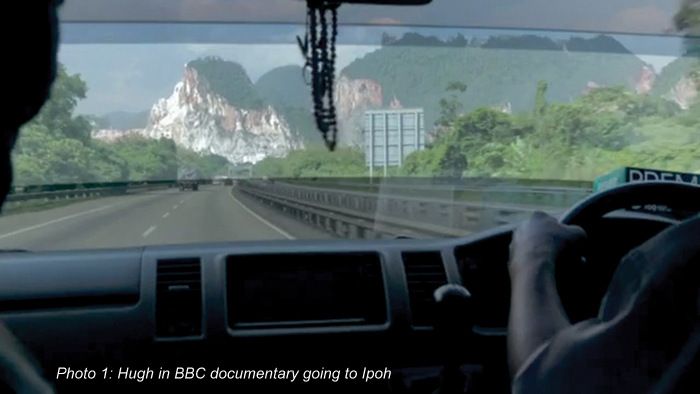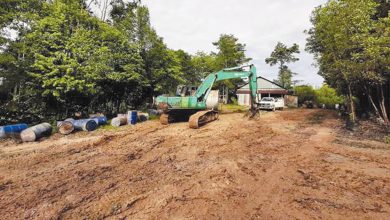Thinking Allowed: Is Ipoh the world’s dumping ground for plastic waste?


By Mariam Mokhtar








On May 25, the state authorities were upset when a UK tabloid, The Daily Mail, wrote about an upcoming BBC TV programme, in which mountains of plastic garbage, had been found in the jungles around Ipoh.
How’s that for irony? If only the authorities would react with urgency and punish the perpetrators who are responsible for the piles of rubbish, uncollected waste, and plastic trash that is dumped in residential areas, established fly-tipping points in and around Ipoh, outside homes, along country lanes, in monsoon drains, rivers and outside business premises.
Don’t only express shock when a foreign publication highlights the waste being dumped in our own backyard. So, are we only going to get a reaction from the authorities, because they are embarrassed by a news report in a UK tabloid, which may or may not be true?
Why can’t we be moved into action, each time our workers and Excos are unable to perform their duties, because of a lack of resources, equipment or workers.
If money is the problem, Ipohities would be horrified to learn that money was sourced to buy a fleet of 16 new Toyota Camry for the Menteri Besar, Ahmad Faizal Azumu, and his Excos, but not enough can be made available for the collection of household rubbish or to pay workers a decent wage.
If workers are an issue, what is behind the allegation that a company which “won” the contract to collect rubbish was based in Johor. If allegations are to be believed, the company, Bujang Holdings Sdn Bhd, has no workers.
Why should Malaysians have any trust in the authorities? In the past, the authorities have either denied or lied about any wrongdoing.
Last May, the UK’s Daily Mail wrote about the BBC trailer for a three-part documentary, about waste intended for recycling, which had been shipped to Malaysia. An unnamed source said, “I am not sure how the garbage can arrive here. It could possibly be through ports and containers.
“We will wait for the reports from the department and the city council.”
True to form, the Director for the Department of Environment (DOE). Norazizi Adinan, denied that there were mountains of unmanaged plastic waste had been dumped in the jungle. He claimed that images of the waste, that had gone viral on social media, was managed waste awaiting processing into fuel and that four foreigners had trespassed onto the site and given an incorrect version of events.
Norazizi said that the company was operating legally in the IGB industrial area in Tasek, and it had not flouted any rules.
The DOE director may wish to watch the BBC programme and see piles of waste in Malaysia.
In 2018, the People’s Republic of China banned imports of waste because of environmental concerns. Undeterred the UK managed to find around 20 countries, which would accept its waste and Malaysia was listed as the highest importer of UK waste; receiving 129,573 tonnes of plastic.
The maker of the documentary, Hugh Fearnley-Whittingstall travelled to Malaysia and was taken to a site in Jenjarom, near Port Klang, by an NGO. They saw several sites, some of which were illegal. The representative of the NGO said, “Some sort of processing is done onsite for the imported waste, but in most cases, the factory picks what they want to be processed and dumps what they do not want.”
Operators of the site had no consideration for the environment. There were no dykes to contain the leached material. This oversight allowed plastic particulate matter to enter drains and rivers.
In the film, a Greenpeace activist informed Hugh that when many of the sites stopped their illegal operations in Selangor, the illegal waste operators, simply shifted their operations further north, to Ipoh. Hugh travelled to Ipoh (photo 1) and found a site with mountains of plastic waste.
The DOE was quick to dismiss the illegal dumping sites and was quick to come to the defence of Resourceco Asia (M) Sdn Bhd, which claimed that they had invited four foreigners to the office, but their offer was rejected and the foreigners proceeded to the disposal site to take pictures using drones.
The director of the DOE claimed that Hugh had been to a legal site, but the one he (Hugh) visited didn’t look legal or manned. The premises seemed deserted, dilapidated and poorly maintained. He and his film crew slipped in through a gap between the gate and the makeshift fence, which appeared to be made from corrugated iron sheets. (Photos 2 & 3).
K. Muralindran, the operations director of Resourceco said that the rubbish at the site was estimated to be two tonnes, which has been collected since the beginning of this year. However, footage of the huge pile of rubbish, which Hugh climbed, was in excess of two tonnes and was piled as far as the eye could see. So, did Hugh visit a different site? (photo 4 & 5)
Are companies able to bring in plastic waste and then dump it, in illegal landfills or burn it instead of properly processing it? Instead of denying responsibility and playing the blame game, the DOE and the state, need to solve our growing problem of plastic waste and rubbish.
Sources:
https://www.thestar.com.my/news/nation/2019/05/27/perak-exco-tasks-environment-dept-to-look-into-uk-reports-of-mounds-of-plastic-waste-in-jungle/
https://www.thestar.com.my/news/nation/2019/05/27/no-pile-of-plastic-waste-found-in-ipoh-jungles-says-doe/


